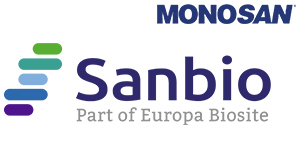Anti-alpha 1 Catenin/CTNNA1 Antibody Picoband™ (monoclonal, 10I2)
Anti-alpha 1 Catenin/CTNNA1 Antibody Picoband™ (monoclonal, 10I2)
Artikelnummer
SANMON23725
Verpackungseinheit
100μg
Hersteller
Sanbio / Monosan
Verfügbarkeit:
wird geladen...
Preis wird geladen...
Clone Number: 10I2
Immunogen: E.coli-derived human CTNNA1 recombinant protein (Position: D143-D292). Human CTNNA1 shares 98% amino acid (aa) sequence identity with mouse CTNNA1.
Concentration: Adding 0.2 ml of distilled water =f 500 μg/ml.
Format: Lyophilized
Storage buffer: Each vial contains 4mg Trehalose, 0.9mg NaCl, 0.2mg Na2HPO4, 0.05mg NaN3.
Additional info: Store at -20˚C for one year from date of receipt. After reconstitution, at 4˚C for one month. It can also be aliquotted and stored frozen at -20˚C for six months. Avoid repeated freeze-thaw cycles.Add 0.2ml of distilled water will yield a concentration of 500ug/ml. Background: CTNNA1, also known as Catenin alpha-1 or Catenin (cadherin-associated protein), alpha 1, is a protein that in humans is encoded by the CTNNA1 gene. It is mapped to 5q31.2. When surface epithelium CTNNA1 was ablated, hair follicle development was blocked and epidermal morphogenesis was dramatically affected, with defects in adherens junction formation, intercellular adhesion, and epithelial polarity. In vitro, CTNNA1 null keratinocytes were poorly contact inhibited and grew rapidly. These differences were not dependent upon intercellular adhesion and were in marked contrast to keratinocytes conditionally null for another essential intercellular adhesion protein, desmoplakin Knockout keratinocytes exhibited sustained activation of the Ras-MAPK cascade due to aberrations in growth factor responses. It is concluded that features of precancerous lesions often attributed to defects in cell cycle regulatory genes can be generated by compromising the function of CTNNA1. Subcellular Localization: Cytoskeleton. Cell membrane. Peripheral membrane protein. Cytoplasmic side. Adherens junction. Cell junction. Tissue Specificity: Expressed ubiquitously in normal tissues.
Immunogen: E.coli-derived human CTNNA1 recombinant protein (Position: D143-D292). Human CTNNA1 shares 98% amino acid (aa) sequence identity with mouse CTNNA1.
Concentration: Adding 0.2 ml of distilled water =f 500 μg/ml.
Format: Lyophilized
Storage buffer: Each vial contains 4mg Trehalose, 0.9mg NaCl, 0.2mg Na2HPO4, 0.05mg NaN3.
Additional info: Store at -20˚C for one year from date of receipt. After reconstitution, at 4˚C for one month. It can also be aliquotted and stored frozen at -20˚C for six months. Avoid repeated freeze-thaw cycles.Add 0.2ml of distilled water will yield a concentration of 500ug/ml. Background: CTNNA1, also known as Catenin alpha-1 or Catenin (cadherin-associated protein), alpha 1, is a protein that in humans is encoded by the CTNNA1 gene. It is mapped to 5q31.2. When surface epithelium CTNNA1 was ablated, hair follicle development was blocked and epidermal morphogenesis was dramatically affected, with defects in adherens junction formation, intercellular adhesion, and epithelial polarity. In vitro, CTNNA1 null keratinocytes were poorly contact inhibited and grew rapidly. These differences were not dependent upon intercellular adhesion and were in marked contrast to keratinocytes conditionally null for another essential intercellular adhesion protein, desmoplakin Knockout keratinocytes exhibited sustained activation of the Ras-MAPK cascade due to aberrations in growth factor responses. It is concluded that features of precancerous lesions often attributed to defects in cell cycle regulatory genes can be generated by compromising the function of CTNNA1. Subcellular Localization: Cytoskeleton. Cell membrane. Peripheral membrane protein. Cytoplasmic side. Adherens junction. Cell junction. Tissue Specificity: Expressed ubiquitously in normal tissues.
| Artikelnummer | SANMON23725 |
|---|---|
| Hersteller | Sanbio / Monosan |
| Hersteller Artikelnummer | MON23725 |
| Green Labware | Nein |
| Verpackungseinheit | 100μg |
| Mengeneinheit | STK |
| Reaktivität | Human, Mouse (Murine), Rat (Rattus) |
| Klonalität | Monoclonal |
| Methode | Western Blotting, Flow Cytometry, Immunohistochemistry |
| Isotyp | IgG1 |
| Wirt | Mouse |
| Produktinformation (PDF) |
|
| MSDS (PDF) |
|

 English
English







